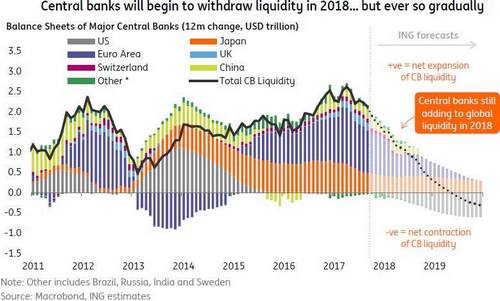การกู้ยืมกำลังลดลง การเปลี่ยนแปลงในนโยบายการเงินที่ Fed เริ่มมาตั้งแต่ปี 2015 กำลังจะเห็นผลในทุกๆตลาดทั่วโลก ...เงิน QE ที่ออกมาท่วมโลกตั้งแต่ปี 2008 จนถึงปี 2015 กำลังจะถูกดูดคืน
ธนาคารกลางสร้าง QE ง่ายๆเพียงแค่คีย์ตัวเลขจำนวนเงินที่ต้องการในคอมพ์ และใช้ซื้อทรัพย์สิน เช่นพันธบัตรรัฐบาล อสังหาฯ สัญญากู้ยืม หุ้นกู้ ฯลฯ..ในตลาดทั่วๆไป .....ทำให้เงินจำนวนมหาศาลไหลเข้าสู่มือเจ้าของทรัพย์สิน.. QE ค่อยๆทำให้สภาพคล่องเพิ่มจำนวนไปทั่วทุกๆตลาดในโลกตามเวลาที่ผ่านไป
เกมการเพิ่มสภาพคล่องเริ่มเปลี่ยนเมื่อนโยบายการทำ QE หยุดลง ..และถ้า Fed ขายทรัพย์ที่ซื้อมาจนเต็มงบดุลของตนเหล่านั้นออกไป มันก็จะไปทำให้สภาพคล่องที่มีอยู่ในตลาดโลกเริ่มที่จะเหือดแห้งลง
Fed เริ่มยุติ QE เมื่อปี 2015 ..ธนาคารกลางยุโรป (ECB) ก็ยุติในปี 2018 ธนาคารกลางญี่ปุ่น (BoJ) ก็กำลังเจรจากันทีจะหยุดการทำ QE ของตน (แต่ยังไม่มีกำหนด) ธนาคารกลางของอังกฤษ (BoE) ก็ยุติไปแล้ว ส่วนจีนยังสับสนอยู่กับนโยบาย ทำให้เดาได้ยากว่าจะหยุดหรือทำต่อไป ...ที่แน่ๆ โลกตะวันตกหยุดไปแล้ว
การเปลี่ยนแปลงลักษณะนี้ในตลาดโลกทำให้มีผลต่อความเชื่อมั่นของนักลงทุน และยังจะทำให้ราคาทรัพย์สินลดลงอีกด้วย จะเห็นได้ขณะนี้จากราคาในภาคอสังหาฯ รถยนตร์ และสินค้าโภคภัณท์ทั่วไปที่ลดลง ..นี่จะไปทำให้เกิดภาวะเศรษฐกิจถดถอยตามมา
มันจะต้องใช้เวลาอีกสักระยะถึงจะเห็นผลอย่างเด่นชัดในตลาดทั่วไป น่าจะอยู่ที่ประมาณเดือน มีนาคมหรือเมษายน 2019 ก่อนที่เหล่านักวิชาการกระแสหลักจะยอมรับว่าเศรษฐกิจโลกกำลังเข้าสู่โหมดถดถอย ...ทางเดียวที่จะกันไว้ได้คือ ธนาคารกลางโลกตะวันตกต้องทำ QE อีกครั้ง แต่มันเป็นเรื่องที่ไม่น่าเกิดขึ้นได้
แล้วเรื่องทั้งหมดนี้มันจะนำไปสู่อะไร ..มันหมายความว่าวงจรของตลาดกระทิงที่เป็นมาตลอด 10 ปีกำลังจะสิ้นสุด ตลาดขาขึ้นทั่วโลกนี้มันยาวนานเป็นประวัติการณ์เลยจากเงิน QE นับล้านล้านดอลล่าร์ทั่วโลก เงินเหล่านี้ไหลเข้าซื้อทรัพย์สินจนทำให้ราคาสูงเป็นฟองสบู่ไปทุกตลาด ...แต่ตอนนี้มันกำลังจะเปลี่ยน เรากำลังจะเข้าสู่วงจรใหม่ที่ทรัพย์สินทั้งหลายในโลกถึงเวลาที่จะต้องตกต่ำลง
ทั้งหลายนี้มันจะมีผลน้อย..หรืออาจเป็นผลดีด้วยซ้ำต่อผู้ที่ไม่มีหนี้หรือหนี้น้อย ...แต่มันจะเป็นผลร้ายต่อผู้ที่มีหนี้มากเกินตัว การเปลี่ยนแปลงนี้เริ่มเห็นได้บ้างแล้วในตลาดหุ้น ความผันผวนนี้ยังจะมีอยู่ต่อไปอีกหลายเดือน ..อีเว้นท์ใหญ่จะมาถึงเมื่อตอนเกิดสถานการณ์ Brexit และการยุติ QE ของญี่ปุ่นและจีน ....อีกไม่กี่เดือนข้างหน้านี้แล้ว .....PREPARE!
Overall Liquidity is now Declining Globally! The Impact?
What is happening today is that overall money supply (liquidity) within our global markets is declining gradually. Borrowing is declining. Lending is declining. All this change in monetary policy which our Fed initiated back in 2015 is now starting to affect all our global markets. The big issue is this change in QE policies which started with our Fed in 2008 and ended in 2015.
QE is a form of money counterfeiting which funnels more liquidity to our markets. A Central Bank creates QE (money) via their computer and then buys assets (like government bonds, etc.) in the marketplace. This buying of government bonds, real estate mortgages, corporate bonds, etc., funnels new deposits into these firms which held these assets. All this QE activity gradually increases global liquidity for all markets over time.
This game of increasing global liquidity is changing as all the QE policies are dropped. And if our Central Banks sell their prior asset holdings (their balance sheet holdings), then this also forces buyers to restrict their spending activity and all this gradually dries up liquidity in our global markets. So who is now stopping their QE operations? The U.S. Fed is the lead Central Bank which has stopped their QE operations as of 2015.
The European Central Bank is now stopping their QE operations as of 2018. The Bank of Japan is talking about stopping their QE operations (but no official word as of yet). The Bank of England has stopped their QE operations. China has a confused policy and it is difficult to discern if they are stopping QE or starting QE. But, generally, the West is now stopping their QE operations.
This change in overall liquidity within our global markets is gradually affecting investor confidence and also is gradually causing asset prices to decline. I witness this change within our real estate sector, our auto sector, and the commodity sectors. Less overall liquidity is slowing down our markets and creating the coming recession (and Bear market).
It takes some time for all this change in liquidity to affect our markets significantly. My estimate is that it will be March or April, 2019, before the main stream pundits will recognize that a recession has hit us. All this could change if a coordinated effort of our Central Banks were to change and everyone were to reinstitute new QE policies. But my sense is that this will NOT occur.
So what does this all mean going forward? To me, this means that the prior 10 year bull cycle is soon over. Our markets had the longest up cycle in history as QE and bank lending increased global liquidity in the trillions. These trillions of money units went into asset purchases and drove up asset prices. A general BUBBLE in asset values occurred. All this has now changed and we are entering a NEW cycle where asset values will generally decline.
All this is positive for consumers who have little to no debt. All this is negative for those with excessive debt. The change in our business cycle is evident as I watch the volatility within our stock markets. I suspect that this volatility will remain for the next few months. The big events coming are the Brexit situation and the stopping of QE for Japan and China. All this could happen in the next few months. PREPARE!
Cr.Sayan Rujiramora
สนับสนุนข่าวโดย ICMarkets
เพิ่มเพื่อนรับข่าวสารตลาดหุ้น Forex และบทความดีๆ ด้านการเงิน การลงทุน ฟรี!!
http://line.me/ti/p/%40zhq5011b
Line ID:@fxhanuman
FB:https://www.facebook.com/review.forex.broker/


